The Role of Social Media on Knowledge Sharing and Transfer
VerifiedAdded on 2023/06/08
|9
|2252
|115
Essay
AI Summary
This essay examines the significant role of social media in promoting knowledge sharing and transfer within organizations. It begins by highlighting the importance of knowledge as a strategic resource for competitive advantage and discusses the challenges organizations face in facilitating knowledge sharing across the globe. The essay defines knowledge sharing as the process by which individual knowledge is transformed into a format that can be understood and utilized by others, influenced by factors such as the nature of knowledge, motivation, opportunity, and organizational culture. It explores the evolution of knowledge sharing through three generations, culminating in the use of social media as a current method for connecting with knowledgeable individuals both inside and outside the organization. Furthermore, the essay details how social media technologies facilitate communication, collaboration, connection, content competition, and content matching and mixing. It concludes by emphasizing the critical role of social media in problem-solving, decision-making, and overall organizational improvement, urging organizations to leverage these tools for enhanced knowledge management. Desklib offers a wide array of resources, including past papers and solved assignments, to support students in their academic endeavors.
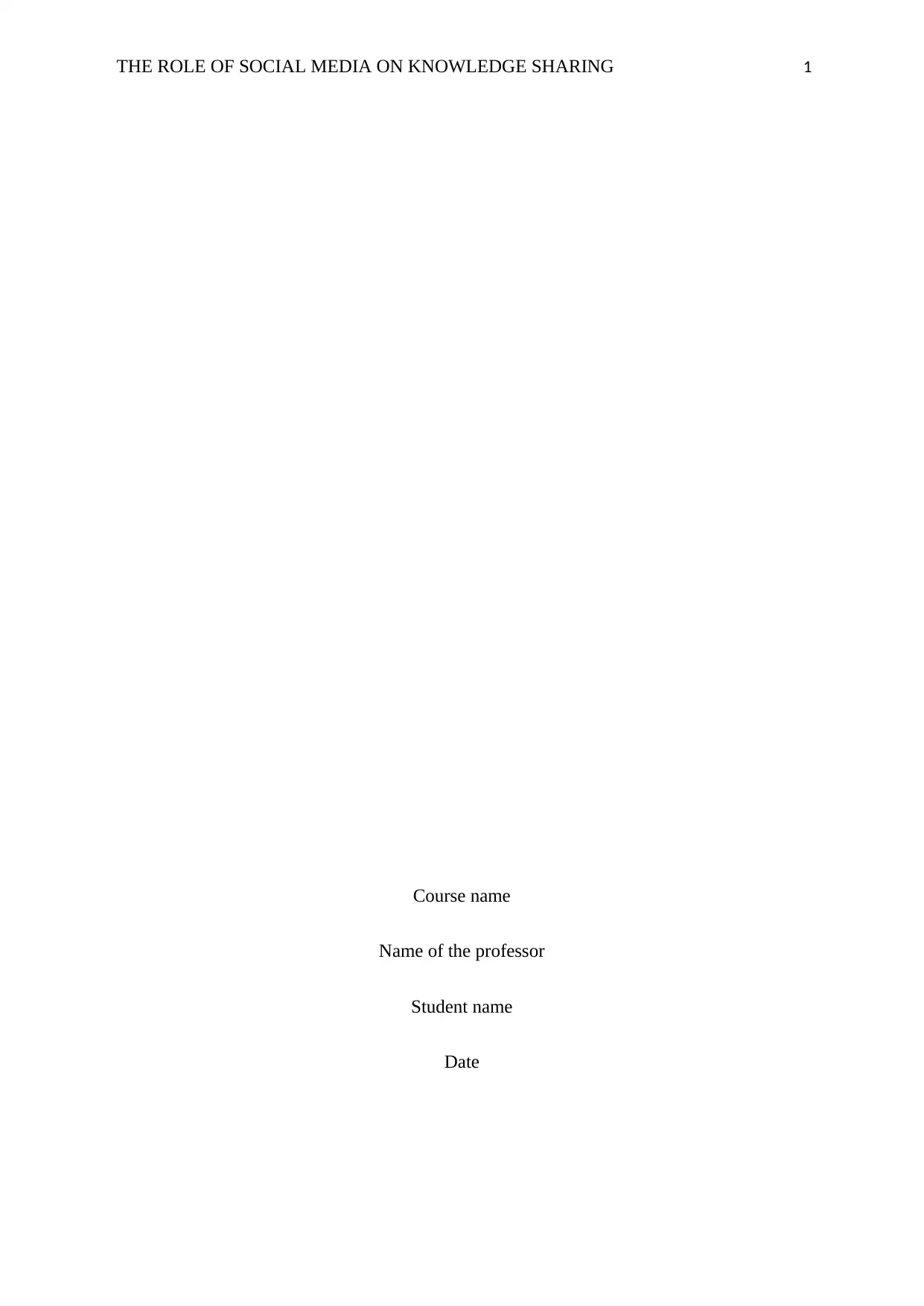
THE ROLE OF SOCIAL MEDIA ON KNOWLEDGE SHARING 1
Course name
Name of the professor
Student name
Date
Course name
Name of the professor
Student name
Date
Paraphrase This Document
Need a fresh take? Get an instant paraphrase of this document with our AI Paraphraser
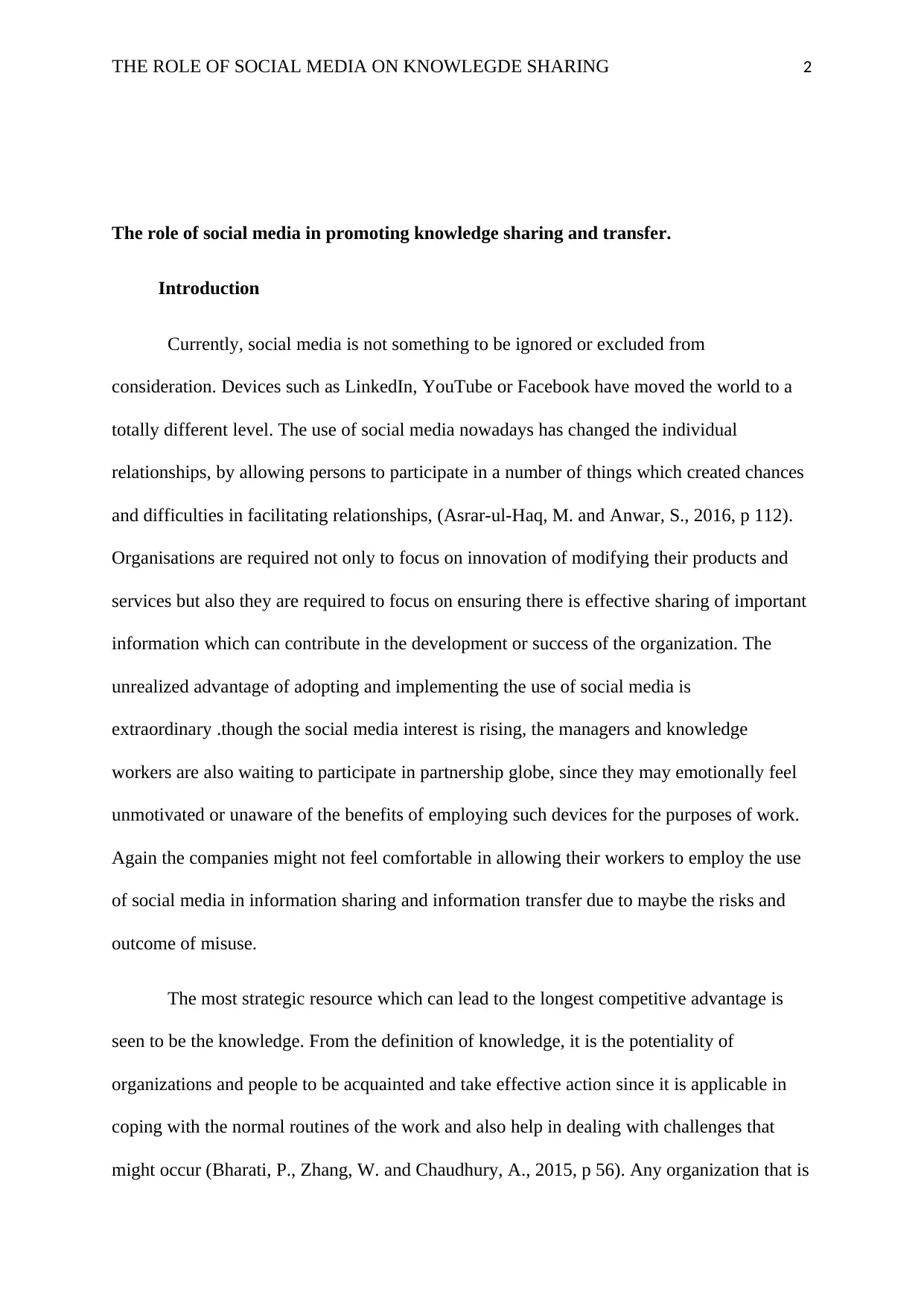
THE ROLE OF SOCIAL MEDIA ON KNOWLEGDE SHARING 2
The role of social media in promoting knowledge sharing and transfer.
Introduction
Currently, social media is not something to be ignored or excluded from
consideration. Devices such as LinkedIn, YouTube or Facebook have moved the world to a
totally different level. The use of social media nowadays has changed the individual
relationships, by allowing persons to participate in a number of things which created chances
and difficulties in facilitating relationships, (Asrar-ul-Haq, M. and Anwar, S., 2016, p 112).
Organisations are required not only to focus on innovation of modifying their products and
services but also they are required to focus on ensuring there is effective sharing of important
information which can contribute in the development or success of the organization. The
unrealized advantage of adopting and implementing the use of social media is
extraordinary .though the social media interest is rising, the managers and knowledge
workers are also waiting to participate in partnership globe, since they may emotionally feel
unmotivated or unaware of the benefits of employing such devices for the purposes of work.
Again the companies might not feel comfortable in allowing their workers to employ the use
of social media in information sharing and information transfer due to maybe the risks and
outcome of misuse.
The most strategic resource which can lead to the longest competitive advantage is
seen to be the knowledge. From the definition of knowledge, it is the potentiality of
organizations and people to be acquainted and take effective action since it is applicable in
coping with the normal routines of the work and also help in dealing with challenges that
might occur (Bharati, P., Zhang, W. and Chaudhury, A., 2015, p 56). Any organization that is
The role of social media in promoting knowledge sharing and transfer.
Introduction
Currently, social media is not something to be ignored or excluded from
consideration. Devices such as LinkedIn, YouTube or Facebook have moved the world to a
totally different level. The use of social media nowadays has changed the individual
relationships, by allowing persons to participate in a number of things which created chances
and difficulties in facilitating relationships, (Asrar-ul-Haq, M. and Anwar, S., 2016, p 112).
Organisations are required not only to focus on innovation of modifying their products and
services but also they are required to focus on ensuring there is effective sharing of important
information which can contribute in the development or success of the organization. The
unrealized advantage of adopting and implementing the use of social media is
extraordinary .though the social media interest is rising, the managers and knowledge
workers are also waiting to participate in partnership globe, since they may emotionally feel
unmotivated or unaware of the benefits of employing such devices for the purposes of work.
Again the companies might not feel comfortable in allowing their workers to employ the use
of social media in information sharing and information transfer due to maybe the risks and
outcome of misuse.
The most strategic resource which can lead to the longest competitive advantage is
seen to be the knowledge. From the definition of knowledge, it is the potentiality of
organizations and people to be acquainted and take effective action since it is applicable in
coping with the normal routines of the work and also help in dealing with challenges that
might occur (Bharati, P., Zhang, W. and Chaudhury, A., 2015, p 56). Any organization that is
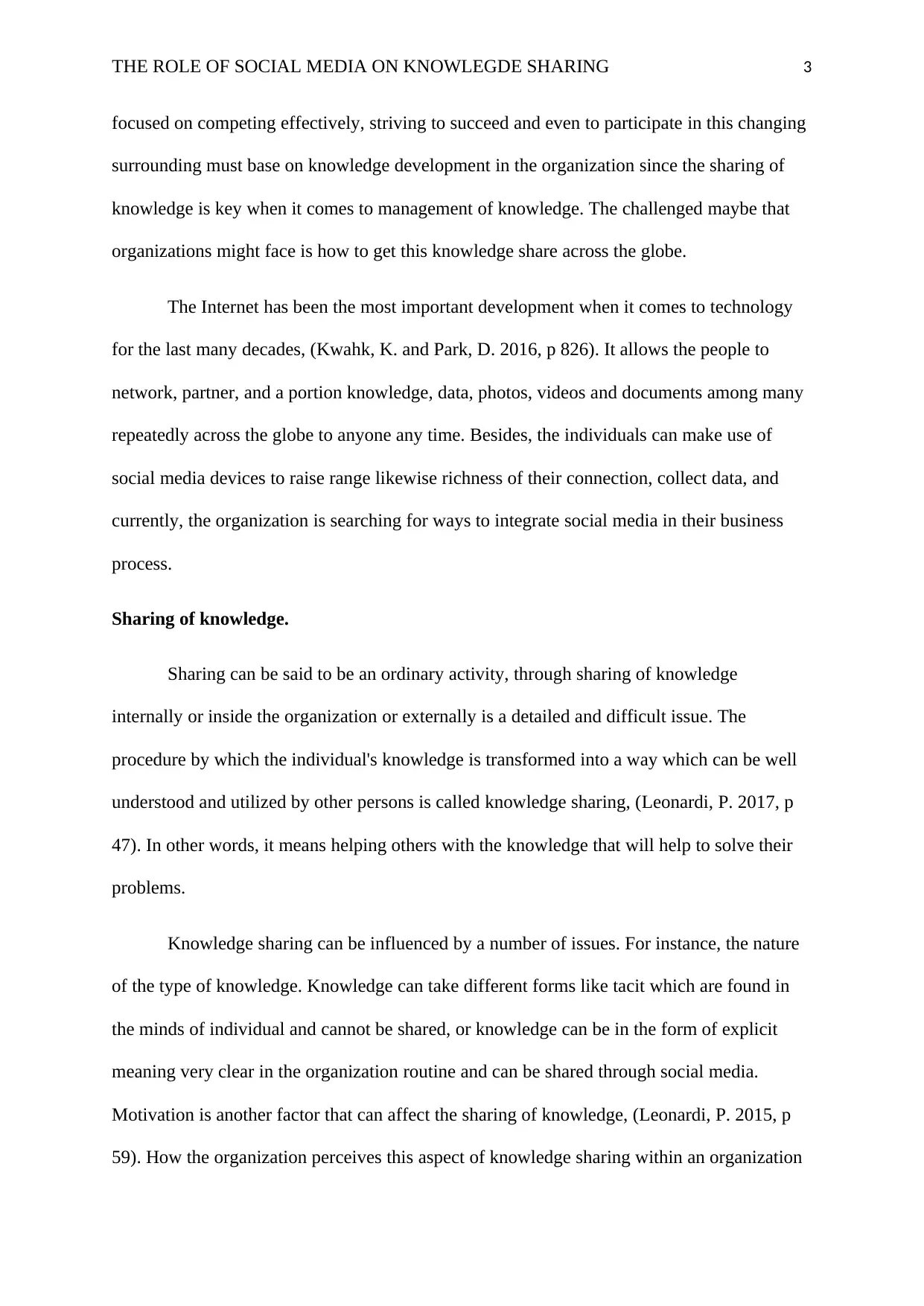
THE ROLE OF SOCIAL MEDIA ON KNOWLEGDE SHARING 3
focused on competing effectively, striving to succeed and even to participate in this changing
surrounding must base on knowledge development in the organization since the sharing of
knowledge is key when it comes to management of knowledge. The challenged maybe that
organizations might face is how to get this knowledge share across the globe.
The Internet has been the most important development when it comes to technology
for the last many decades, (Kwahk, K. and Park, D. 2016, p 826). It allows the people to
network, partner, and a portion knowledge, data, photos, videos and documents among many
repeatedly across the globe to anyone any time. Besides, the individuals can make use of
social media devices to raise range likewise richness of their connection, collect data, and
currently, the organization is searching for ways to integrate social media in their business
process.
Sharing of knowledge.
Sharing can be said to be an ordinary activity, through sharing of knowledge
internally or inside the organization or externally is a detailed and difficult issue. The
procedure by which the individual's knowledge is transformed into a way which can be well
understood and utilized by other persons is called knowledge sharing, (Leonardi, P. 2017, p
47). In other words, it means helping others with the knowledge that will help to solve their
problems.
Knowledge sharing can be influenced by a number of issues. For instance, the nature
of the type of knowledge. Knowledge can take different forms like tacit which are found in
the minds of individual and cannot be shared, or knowledge can be in the form of explicit
meaning very clear in the organization routine and can be shared through social media.
Motivation is another factor that can affect the sharing of knowledge, (Leonardi, P. 2015, p
59). How the organization perceives this aspect of knowledge sharing within an organization
focused on competing effectively, striving to succeed and even to participate in this changing
surrounding must base on knowledge development in the organization since the sharing of
knowledge is key when it comes to management of knowledge. The challenged maybe that
organizations might face is how to get this knowledge share across the globe.
The Internet has been the most important development when it comes to technology
for the last many decades, (Kwahk, K. and Park, D. 2016, p 826). It allows the people to
network, partner, and a portion knowledge, data, photos, videos and documents among many
repeatedly across the globe to anyone any time. Besides, the individuals can make use of
social media devices to raise range likewise richness of their connection, collect data, and
currently, the organization is searching for ways to integrate social media in their business
process.
Sharing of knowledge.
Sharing can be said to be an ordinary activity, through sharing of knowledge
internally or inside the organization or externally is a detailed and difficult issue. The
procedure by which the individual's knowledge is transformed into a way which can be well
understood and utilized by other persons is called knowledge sharing, (Leonardi, P. 2017, p
47). In other words, it means helping others with the knowledge that will help to solve their
problems.
Knowledge sharing can be influenced by a number of issues. For instance, the nature
of the type of knowledge. Knowledge can take different forms like tacit which are found in
the minds of individual and cannot be shared, or knowledge can be in the form of explicit
meaning very clear in the organization routine and can be shared through social media.
Motivation is another factor that can affect the sharing of knowledge, (Leonardi, P. 2015, p
59). How the organization perceives this aspect of knowledge sharing within an organization
⊘ This is a preview!⊘
Do you want full access?
Subscribe today to unlock all pages.

Trusted by 1+ million students worldwide
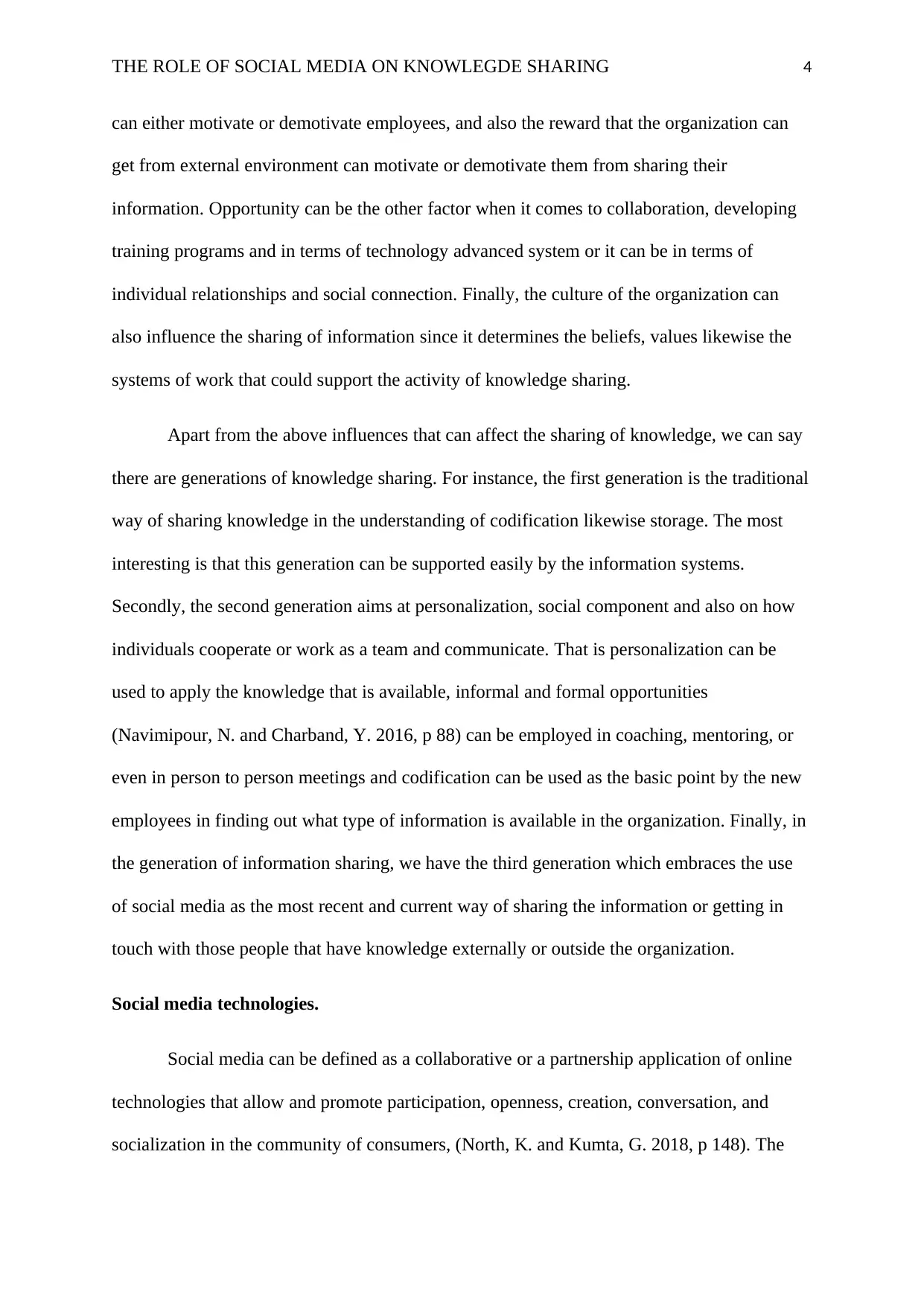
THE ROLE OF SOCIAL MEDIA ON KNOWLEGDE SHARING 4
can either motivate or demotivate employees, and also the reward that the organization can
get from external environment can motivate or demotivate them from sharing their
information. Opportunity can be the other factor when it comes to collaboration, developing
training programs and in terms of technology advanced system or it can be in terms of
individual relationships and social connection. Finally, the culture of the organization can
also influence the sharing of information since it determines the beliefs, values likewise the
systems of work that could support the activity of knowledge sharing.
Apart from the above influences that can affect the sharing of knowledge, we can say
there are generations of knowledge sharing. For instance, the first generation is the traditional
way of sharing knowledge in the understanding of codification likewise storage. The most
interesting is that this generation can be supported easily by the information systems.
Secondly, the second generation aims at personalization, social component and also on how
individuals cooperate or work as a team and communicate. That is personalization can be
used to apply the knowledge that is available, informal and formal opportunities
(Navimipour, N. and Charband, Y. 2016, p 88) can be employed in coaching, mentoring, or
even in person to person meetings and codification can be used as the basic point by the new
employees in finding out what type of information is available in the organization. Finally, in
the generation of information sharing, we have the third generation which embraces the use
of social media as the most recent and current way of sharing the information or getting in
touch with those people that have knowledge externally or outside the organization.
Social media technologies.
Social media can be defined as a collaborative or a partnership application of online
technologies that allow and promote participation, openness, creation, conversation, and
socialization in the community of consumers, (North, K. and Kumta, G. 2018, p 148). The
can either motivate or demotivate employees, and also the reward that the organization can
get from external environment can motivate or demotivate them from sharing their
information. Opportunity can be the other factor when it comes to collaboration, developing
training programs and in terms of technology advanced system or it can be in terms of
individual relationships and social connection. Finally, the culture of the organization can
also influence the sharing of information since it determines the beliefs, values likewise the
systems of work that could support the activity of knowledge sharing.
Apart from the above influences that can affect the sharing of knowledge, we can say
there are generations of knowledge sharing. For instance, the first generation is the traditional
way of sharing knowledge in the understanding of codification likewise storage. The most
interesting is that this generation can be supported easily by the information systems.
Secondly, the second generation aims at personalization, social component and also on how
individuals cooperate or work as a team and communicate. That is personalization can be
used to apply the knowledge that is available, informal and formal opportunities
(Navimipour, N. and Charband, Y. 2016, p 88) can be employed in coaching, mentoring, or
even in person to person meetings and codification can be used as the basic point by the new
employees in finding out what type of information is available in the organization. Finally, in
the generation of information sharing, we have the third generation which embraces the use
of social media as the most recent and current way of sharing the information or getting in
touch with those people that have knowledge externally or outside the organization.
Social media technologies.
Social media can be defined as a collaborative or a partnership application of online
technologies that allow and promote participation, openness, creation, conversation, and
socialization in the community of consumers, (North, K. and Kumta, G. 2018, p 148). The
Paraphrase This Document
Need a fresh take? Get an instant paraphrase of this document with our AI Paraphraser
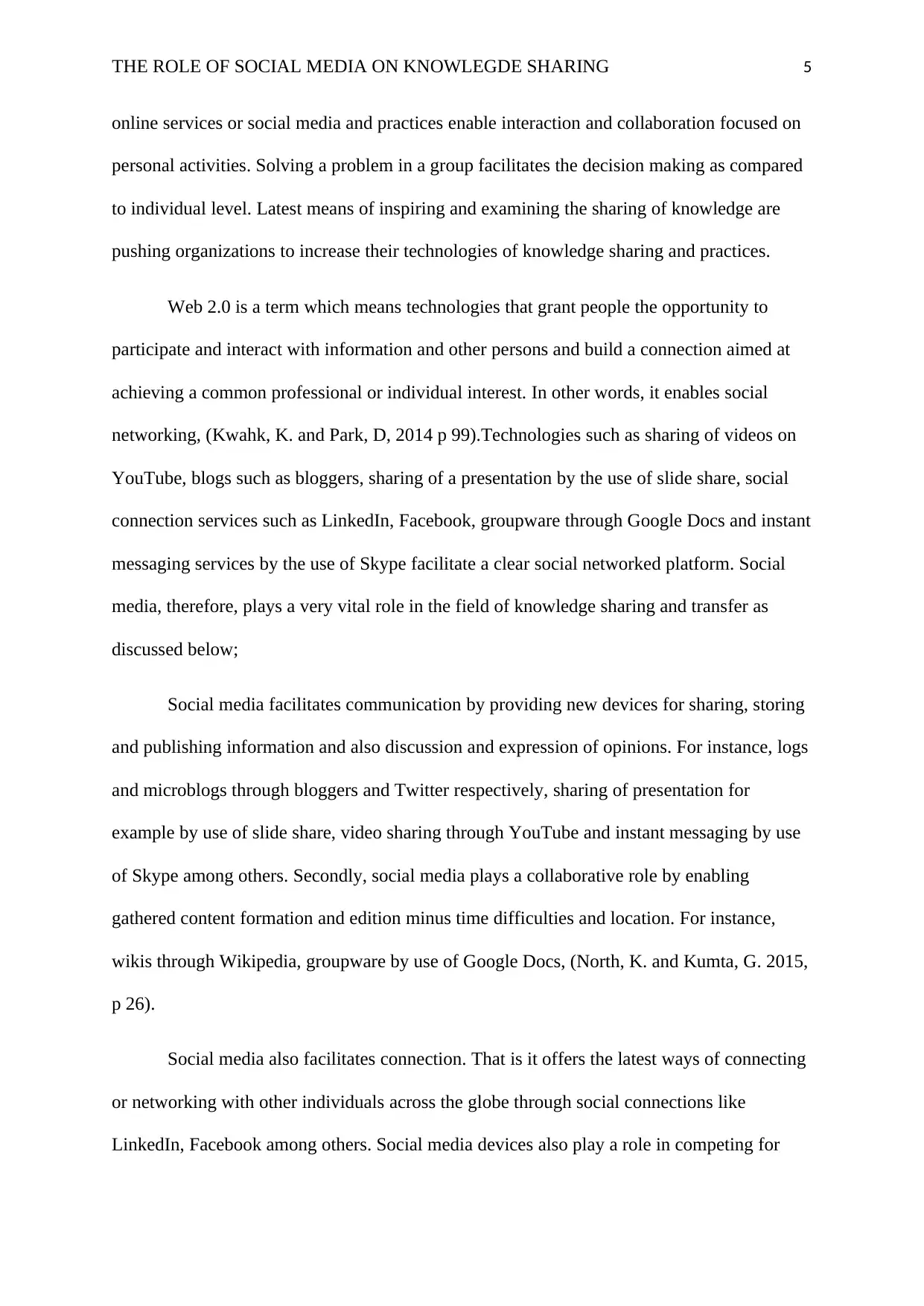
THE ROLE OF SOCIAL MEDIA ON KNOWLEGDE SHARING 5
online services or social media and practices enable interaction and collaboration focused on
personal activities. Solving a problem in a group facilitates the decision making as compared
to individual level. Latest means of inspiring and examining the sharing of knowledge are
pushing organizations to increase their technologies of knowledge sharing and practices.
Web 2.0 is a term which means technologies that grant people the opportunity to
participate and interact with information and other persons and build a connection aimed at
achieving a common professional or individual interest. In other words, it enables social
networking, (Kwahk, K. and Park, D, 2014 p 99).Technologies such as sharing of videos on
YouTube, blogs such as bloggers, sharing of a presentation by the use of slide share, social
connection services such as LinkedIn, Facebook, groupware through Google Docs and instant
messaging services by the use of Skype facilitate a clear social networked platform. Social
media, therefore, plays a very vital role in the field of knowledge sharing and transfer as
discussed below;
Social media facilitates communication by providing new devices for sharing, storing
and publishing information and also discussion and expression of opinions. For instance, logs
and microblogs through bloggers and Twitter respectively, sharing of presentation for
example by use of slide share, video sharing through YouTube and instant messaging by use
of Skype among others. Secondly, social media plays a collaborative role by enabling
gathered content formation and edition minus time difficulties and location. For instance,
wikis through Wikipedia, groupware by use of Google Docs, (North, K. and Kumta, G. 2015,
p 26).
Social media also facilitates connection. That is it offers the latest ways of connecting
or networking with other individuals across the globe through social connections like
LinkedIn, Facebook among others. Social media devices also play a role in competing for
online services or social media and practices enable interaction and collaboration focused on
personal activities. Solving a problem in a group facilitates the decision making as compared
to individual level. Latest means of inspiring and examining the sharing of knowledge are
pushing organizations to increase their technologies of knowledge sharing and practices.
Web 2.0 is a term which means technologies that grant people the opportunity to
participate and interact with information and other persons and build a connection aimed at
achieving a common professional or individual interest. In other words, it enables social
networking, (Kwahk, K. and Park, D, 2014 p 99).Technologies such as sharing of videos on
YouTube, blogs such as bloggers, sharing of a presentation by the use of slide share, social
connection services such as LinkedIn, Facebook, groupware through Google Docs and instant
messaging services by the use of Skype facilitate a clear social networked platform. Social
media, therefore, plays a very vital role in the field of knowledge sharing and transfer as
discussed below;
Social media facilitates communication by providing new devices for sharing, storing
and publishing information and also discussion and expression of opinions. For instance, logs
and microblogs through bloggers and Twitter respectively, sharing of presentation for
example by use of slide share, video sharing through YouTube and instant messaging by use
of Skype among others. Secondly, social media plays a collaborative role by enabling
gathered content formation and edition minus time difficulties and location. For instance,
wikis through Wikipedia, groupware by use of Google Docs, (North, K. and Kumta, G. 2015,
p 26).
Social media also facilitates connection. That is it offers the latest ways of connecting
or networking with other individuals across the globe through social connections like
LinkedIn, Facebook among others. Social media devices also play a role in competing for
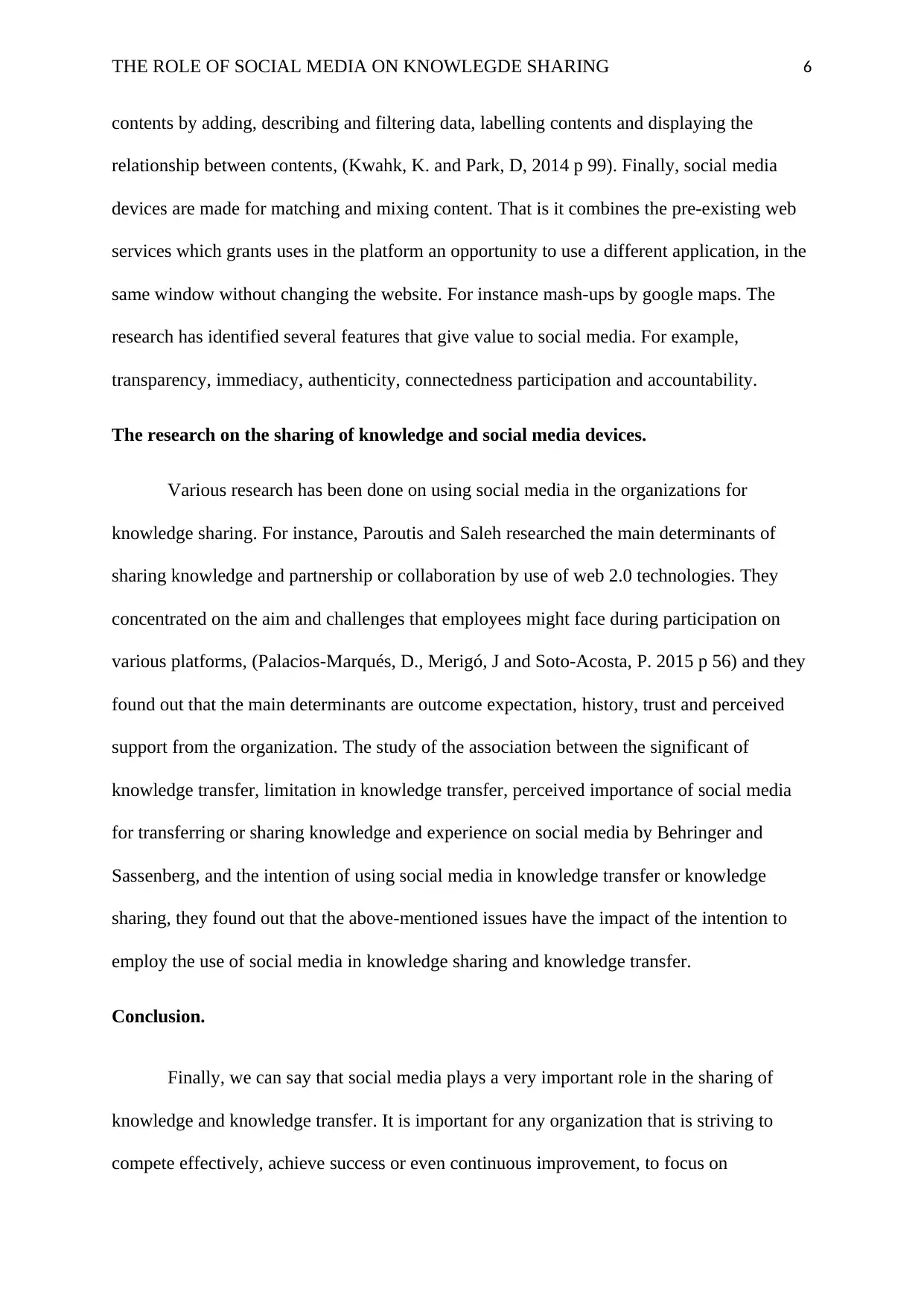
THE ROLE OF SOCIAL MEDIA ON KNOWLEGDE SHARING 6
contents by adding, describing and filtering data, labelling contents and displaying the
relationship between contents, (Kwahk, K. and Park, D, 2014 p 99). Finally, social media
devices are made for matching and mixing content. That is it combines the pre-existing web
services which grants uses in the platform an opportunity to use a different application, in the
same window without changing the website. For instance mash-ups by google maps. The
research has identified several features that give value to social media. For example,
transparency, immediacy, authenticity, connectedness participation and accountability.
The research on the sharing of knowledge and social media devices.
Various research has been done on using social media in the organizations for
knowledge sharing. For instance, Paroutis and Saleh researched the main determinants of
sharing knowledge and partnership or collaboration by use of web 2.0 technologies. They
concentrated on the aim and challenges that employees might face during participation on
various platforms, (Palacios-Marqués, D., Merigó, J and Soto-Acosta, P. 2015 p 56) and they
found out that the main determinants are outcome expectation, history, trust and perceived
support from the organization. The study of the association between the significant of
knowledge transfer, limitation in knowledge transfer, perceived importance of social media
for transferring or sharing knowledge and experience on social media by Behringer and
Sassenberg, and the intention of using social media in knowledge transfer or knowledge
sharing, they found out that the above-mentioned issues have the impact of the intention to
employ the use of social media in knowledge sharing and knowledge transfer.
Conclusion.
Finally, we can say that social media plays a very important role in the sharing of
knowledge and knowledge transfer. It is important for any organization that is striving to
compete effectively, achieve success or even continuous improvement, to focus on
contents by adding, describing and filtering data, labelling contents and displaying the
relationship between contents, (Kwahk, K. and Park, D, 2014 p 99). Finally, social media
devices are made for matching and mixing content. That is it combines the pre-existing web
services which grants uses in the platform an opportunity to use a different application, in the
same window without changing the website. For instance mash-ups by google maps. The
research has identified several features that give value to social media. For example,
transparency, immediacy, authenticity, connectedness participation and accountability.
The research on the sharing of knowledge and social media devices.
Various research has been done on using social media in the organizations for
knowledge sharing. For instance, Paroutis and Saleh researched the main determinants of
sharing knowledge and partnership or collaboration by use of web 2.0 technologies. They
concentrated on the aim and challenges that employees might face during participation on
various platforms, (Palacios-Marqués, D., Merigó, J and Soto-Acosta, P. 2015 p 56) and they
found out that the main determinants are outcome expectation, history, trust and perceived
support from the organization. The study of the association between the significant of
knowledge transfer, limitation in knowledge transfer, perceived importance of social media
for transferring or sharing knowledge and experience on social media by Behringer and
Sassenberg, and the intention of using social media in knowledge transfer or knowledge
sharing, they found out that the above-mentioned issues have the impact of the intention to
employ the use of social media in knowledge sharing and knowledge transfer.
Conclusion.
Finally, we can say that social media plays a very important role in the sharing of
knowledge and knowledge transfer. It is important for any organization that is striving to
compete effectively, achieve success or even continuous improvement, to focus on
⊘ This is a preview!⊘
Do you want full access?
Subscribe today to unlock all pages.

Trusted by 1+ million students worldwide
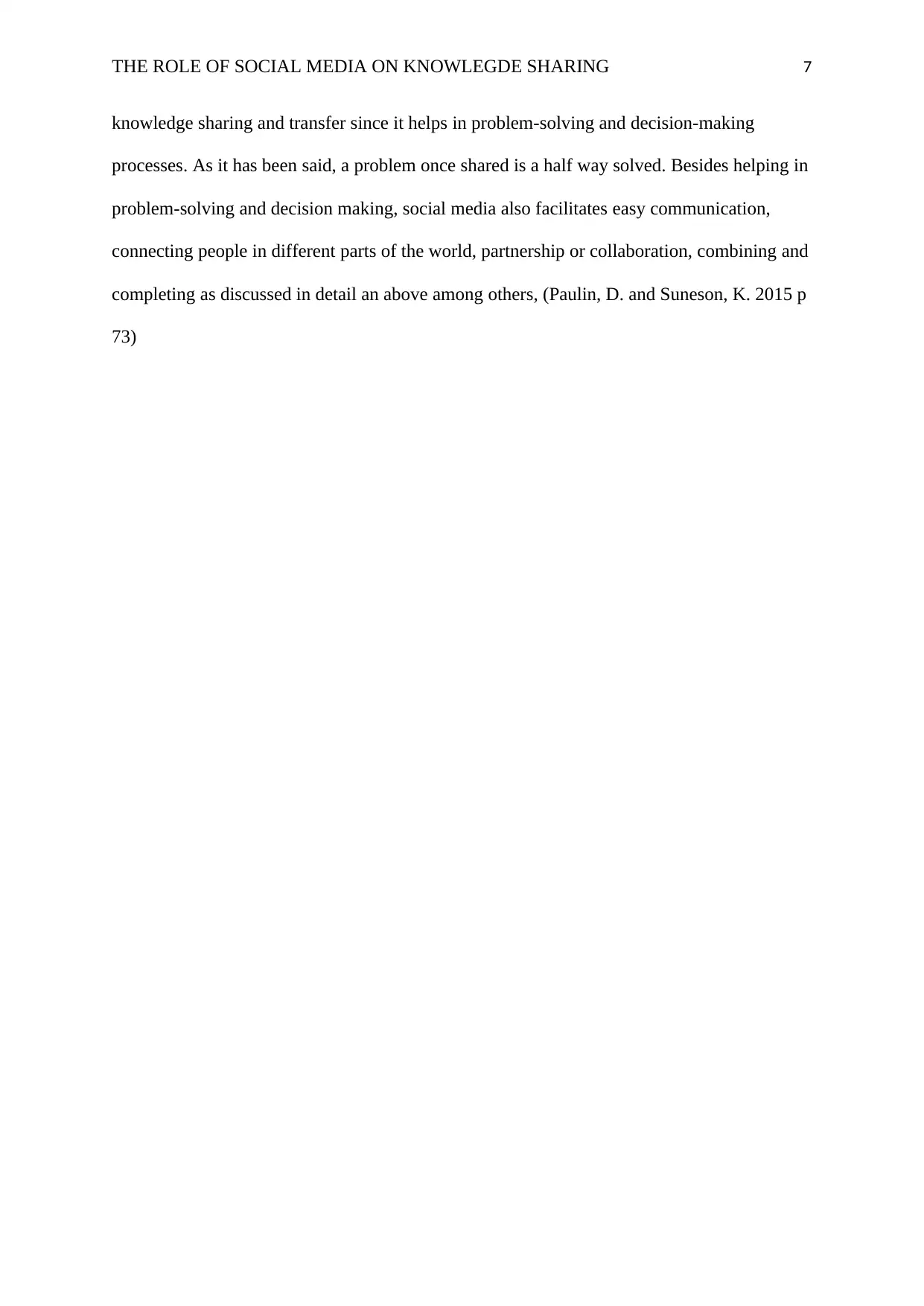
THE ROLE OF SOCIAL MEDIA ON KNOWLEGDE SHARING 7
knowledge sharing and transfer since it helps in problem-solving and decision-making
processes. As it has been said, a problem once shared is a half way solved. Besides helping in
problem-solving and decision making, social media also facilitates easy communication,
connecting people in different parts of the world, partnership or collaboration, combining and
completing as discussed in detail an above among others, (Paulin, D. and Suneson, K. 2015 p
73)
knowledge sharing and transfer since it helps in problem-solving and decision-making
processes. As it has been said, a problem once shared is a half way solved. Besides helping in
problem-solving and decision making, social media also facilitates easy communication,
connecting people in different parts of the world, partnership or collaboration, combining and
completing as discussed in detail an above among others, (Paulin, D. and Suneson, K. 2015 p
73)
Paraphrase This Document
Need a fresh take? Get an instant paraphrase of this document with our AI Paraphraser
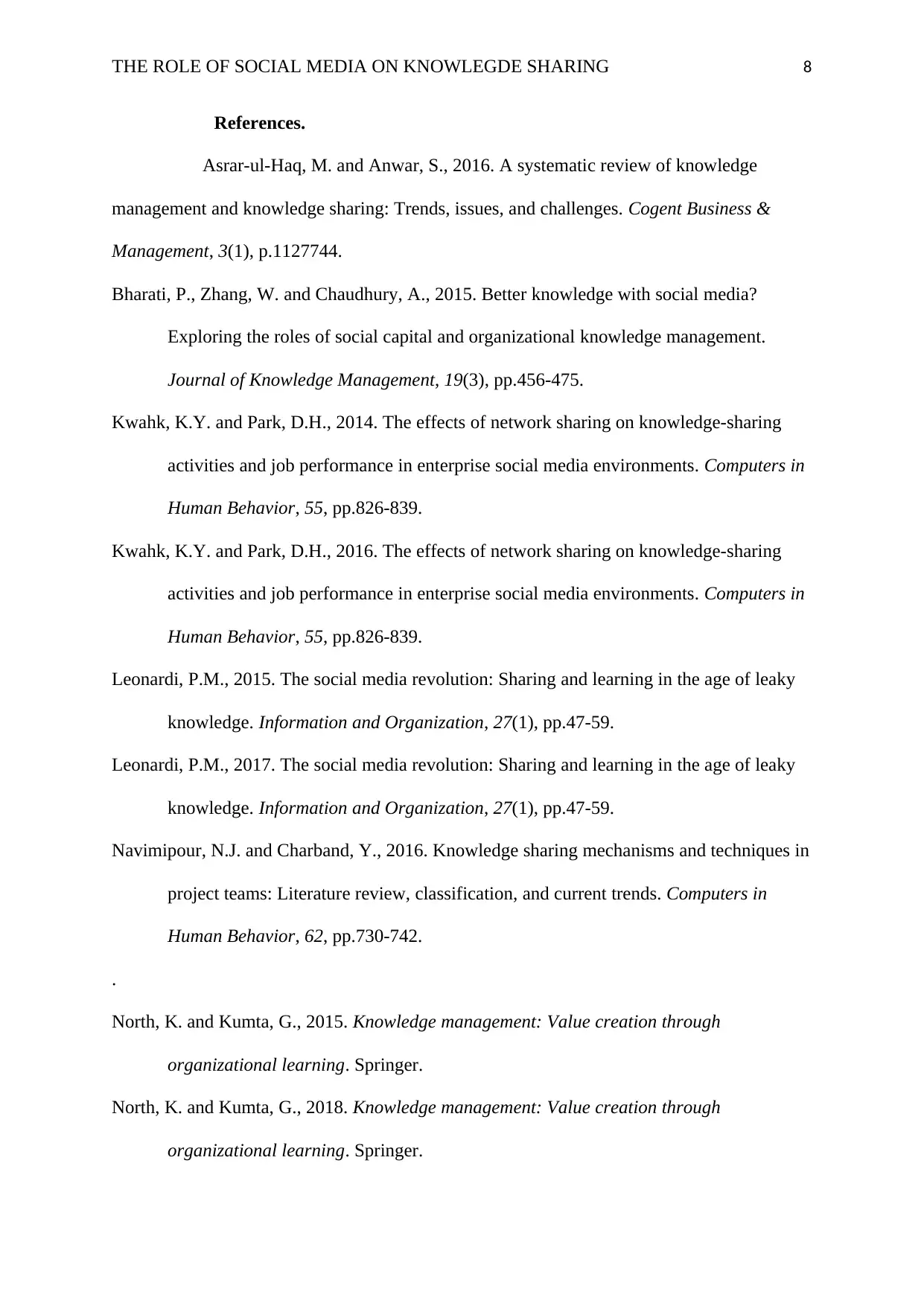
THE ROLE OF SOCIAL MEDIA ON KNOWLEGDE SHARING 8
References.
Asrar-ul-Haq, M. and Anwar, S., 2016. A systematic review of knowledge
management and knowledge sharing: Trends, issues, and challenges. Cogent Business &
Management, 3(1), p.1127744.
Bharati, P., Zhang, W. and Chaudhury, A., 2015. Better knowledge with social media?
Exploring the roles of social capital and organizational knowledge management.
Journal of Knowledge Management, 19(3), pp.456-475.
Kwahk, K.Y. and Park, D.H., 2014. The effects of network sharing on knowledge-sharing
activities and job performance in enterprise social media environments. Computers in
Human Behavior, 55, pp.826-839.
Kwahk, K.Y. and Park, D.H., 2016. The effects of network sharing on knowledge-sharing
activities and job performance in enterprise social media environments. Computers in
Human Behavior, 55, pp.826-839.
Leonardi, P.M., 2015. The social media revolution: Sharing and learning in the age of leaky
knowledge. Information and Organization, 27(1), pp.47-59.
Leonardi, P.M., 2017. The social media revolution: Sharing and learning in the age of leaky
knowledge. Information and Organization, 27(1), pp.47-59.
Navimipour, N.J. and Charband, Y., 2016. Knowledge sharing mechanisms and techniques in
project teams: Literature review, classification, and current trends. Computers in
Human Behavior, 62, pp.730-742.
.
North, K. and Kumta, G., 2015. Knowledge management: Value creation through
organizational learning. Springer.
North, K. and Kumta, G., 2018. Knowledge management: Value creation through
organizational learning. Springer.
References.
Asrar-ul-Haq, M. and Anwar, S., 2016. A systematic review of knowledge
management and knowledge sharing: Trends, issues, and challenges. Cogent Business &
Management, 3(1), p.1127744.
Bharati, P., Zhang, W. and Chaudhury, A., 2015. Better knowledge with social media?
Exploring the roles of social capital and organizational knowledge management.
Journal of Knowledge Management, 19(3), pp.456-475.
Kwahk, K.Y. and Park, D.H., 2014. The effects of network sharing on knowledge-sharing
activities and job performance in enterprise social media environments. Computers in
Human Behavior, 55, pp.826-839.
Kwahk, K.Y. and Park, D.H., 2016. The effects of network sharing on knowledge-sharing
activities and job performance in enterprise social media environments. Computers in
Human Behavior, 55, pp.826-839.
Leonardi, P.M., 2015. The social media revolution: Sharing and learning in the age of leaky
knowledge. Information and Organization, 27(1), pp.47-59.
Leonardi, P.M., 2017. The social media revolution: Sharing and learning in the age of leaky
knowledge. Information and Organization, 27(1), pp.47-59.
Navimipour, N.J. and Charband, Y., 2016. Knowledge sharing mechanisms and techniques in
project teams: Literature review, classification, and current trends. Computers in
Human Behavior, 62, pp.730-742.
.
North, K. and Kumta, G., 2015. Knowledge management: Value creation through
organizational learning. Springer.
North, K. and Kumta, G., 2018. Knowledge management: Value creation through
organizational learning. Springer.
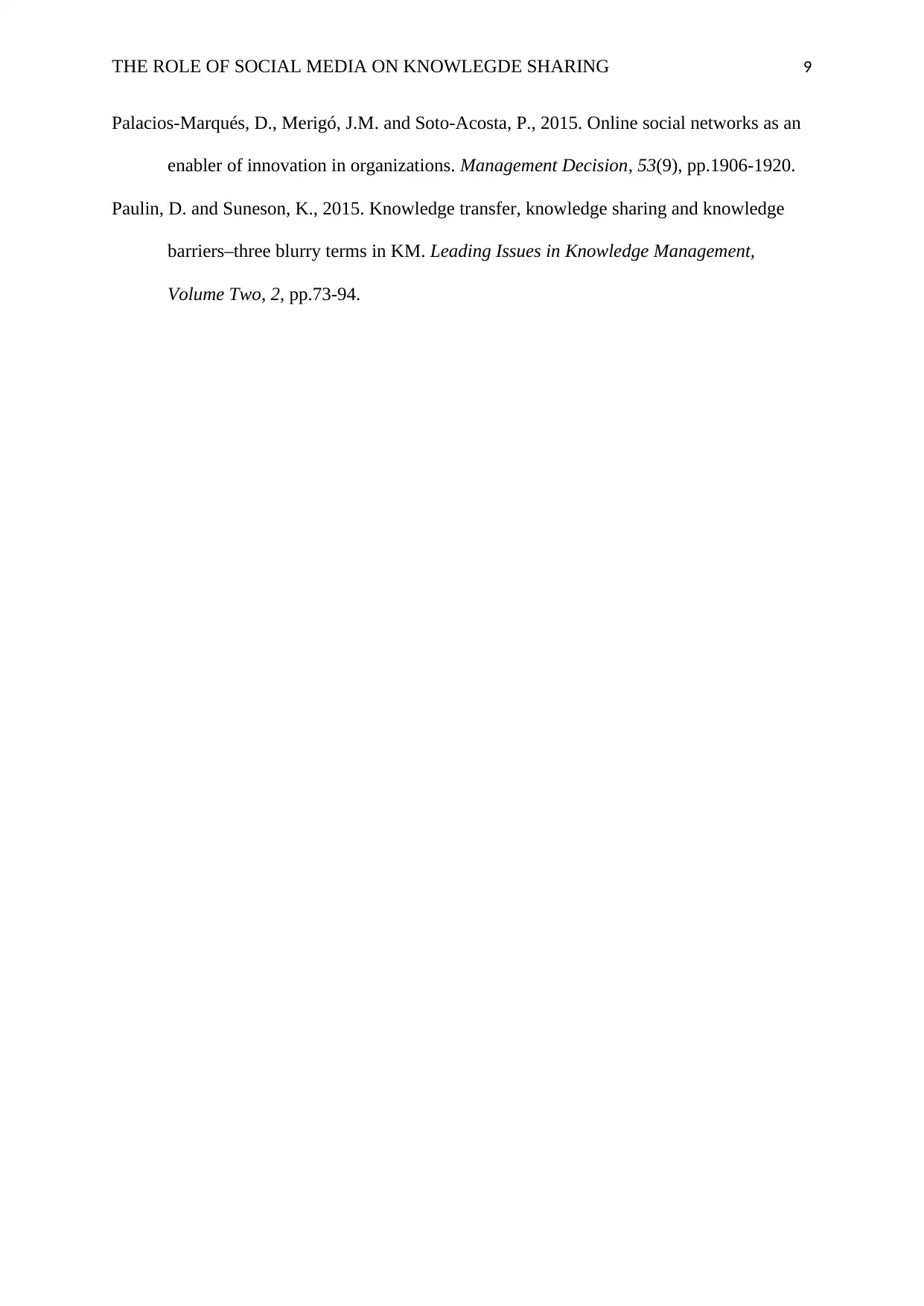
THE ROLE OF SOCIAL MEDIA ON KNOWLEGDE SHARING 9
Palacios-Marqués, D., Merigó, J.M. and Soto-Acosta, P., 2015. Online social networks as an
enabler of innovation in organizations. Management Decision, 53(9), pp.1906-1920.
Paulin, D. and Suneson, K., 2015. Knowledge transfer, knowledge sharing and knowledge
barriers–three blurry terms in KM. Leading Issues in Knowledge Management,
Volume Two, 2, pp.73-94.
Palacios-Marqués, D., Merigó, J.M. and Soto-Acosta, P., 2015. Online social networks as an
enabler of innovation in organizations. Management Decision, 53(9), pp.1906-1920.
Paulin, D. and Suneson, K., 2015. Knowledge transfer, knowledge sharing and knowledge
barriers–three blurry terms in KM. Leading Issues in Knowledge Management,
Volume Two, 2, pp.73-94.
⊘ This is a preview!⊘
Do you want full access?
Subscribe today to unlock all pages.

Trusted by 1+ million students worldwide
1 out of 9
Related Documents
Your All-in-One AI-Powered Toolkit for Academic Success.
+13062052269
info@desklib.com
Available 24*7 on WhatsApp / Email
![[object Object]](/_next/static/media/star-bottom.7253800d.svg)
Unlock your academic potential
Copyright © 2020–2026 A2Z Services. All Rights Reserved. Developed and managed by ZUCOL.




